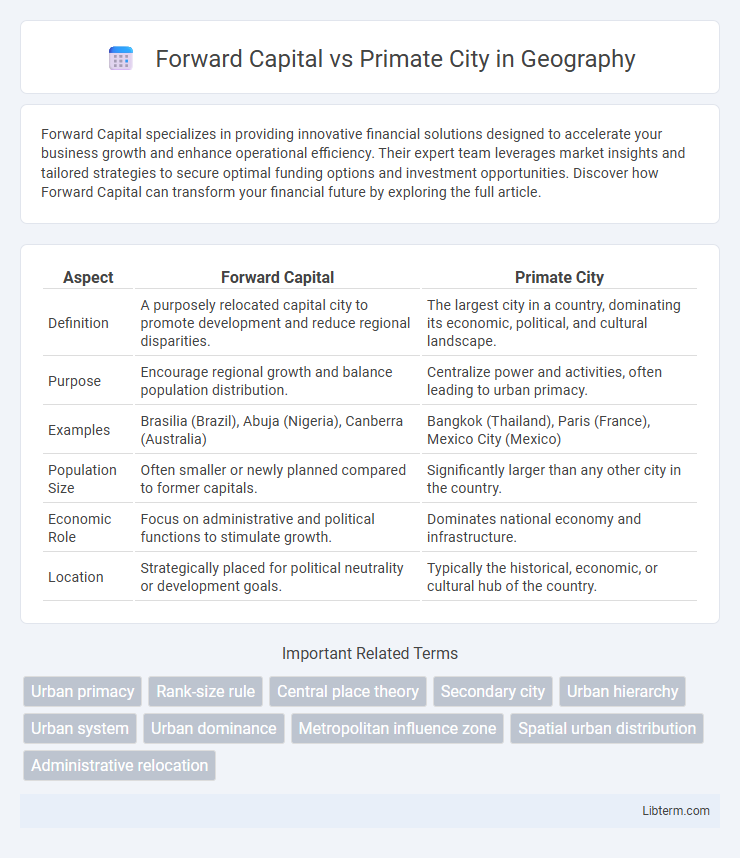Forward Capital specializes in providing innovative financial solutions designed to accelerate your business growth and enhance operational efficiency. Their expert team leverages market insights and tailored strategies to secure optimal funding options and investment opportunities. Discover how Forward Capital can transform your financial future by exploring the full article.
Table of Comparison
| Aspect | Forward Capital | Primate City |
|---|---|---|
| Definition | A purposely relocated capital city to promote development and reduce regional disparities. | The largest city in a country, dominating its economic, political, and cultural landscape. |
| Purpose | Encourage regional growth and balance population distribution. | Centralize power and activities, often leading to urban primacy. |
| Examples | Brasilia (Brazil), Abuja (Nigeria), Canberra (Australia) | Bangkok (Thailand), Paris (France), Mexico City (Mexico) |
| Population Size | Often smaller or newly planned compared to former capitals. | Significantly larger than any other city in the country. |
| Economic Role | Focus on administrative and political functions to stimulate growth. | Dominates national economy and infrastructure. |
| Location | Strategically placed for political neutrality or development goals. | Typically the historical, economic, or cultural hub of the country. |
Introduction to Forward Capitals and Primate Cities
Forward capitals are strategically established cities intended to promote economic growth, political control, or regional development away from traditional urban centers. Primate cities dominate a country's urban hierarchy, often serving as the largest, most influential city with disproportionate population and economic activity. Understanding the differences between forward capitals and primate cities reveals diverse approaches to urban planning and national development.
Defining Forward Capital: Concept and Examples
Forward capital refers to a strategically relocated administrative center designed to stimulate regional development, enhance political control, or improve accessibility within a country. Notable examples include Brasilia in Brazil, moved inland to promote development away from the coast, and Islamabad in Pakistan, chosen to replace Karachi due to its central location and security advantages. These capitals often symbolize national unity and economic progress while addressing geopolitical or spatial challenges faced by the original capital.
Primate City: Definition and Global Instances
Primate city refers to the largest city in a country that is disproportionately larger and more influential than any other city, often serving as the political, economic, and cultural hub. Examples of primate cities include Bangkok in Thailand, Mexico City in Mexico, and Cairo in Egypt, where these urban centers dominate national activities. Unlike forward capitals, which are deliberately established or relocated for strategic reasons, primate cities naturally evolve into dominant urban centers due to historical, economic, and social factors.
Historical Motivations Behind Establishing Forward Capitals
Forward capitals were established to strategically assert control over contested territories or to promote political stability by relocating administrative centers away from vulnerable or overcrowded primate cities. Historical examples include Brazil's creation of Brasilia and Nigeria's Abuja, both chosen to encourage regional development and diminish the dominance of coastal primate cities like Rio de Janeiro and Lagos. These relocations aimed to unify diverse regions, enhance security, and stimulate economic growth inland, addressing geopolitical and socio-economic challenges present in primate city dominance.
Socioeconomic Impacts of Primate Cities
Primate cities often dominate their countries' economies, concentrating wealth, job opportunities, and infrastructure development, which can exacerbate regional disparities and limit growth in other urban areas. Forward capital cities, strategically established to promote balanced regional development, help redistribute socioeconomic resources and reduce the overconcentration seen in primate cities. The centralization in primate cities frequently leads to increased living costs, urban congestion, and social inequality, negatively impacting overall national economic stability and quality of life.
Urban Planning: Forward Capitals vs Primate City Dynamics
Forward capitals represent deliberate urban planning initiatives designed to redistribute political power and stimulate economic growth, often situated in less developed regions to promote balanced national development. In contrast, primate cities dominate the urban hierarchy with disproportionate population size and economic activity, frequently resulting in centralized resources, congestion, and uneven regional development. The dynamic tension between forward capitals and primate cities highlights strategic decisions in urban planning to counteract primate city dominance by fostering new growth poles and decentralizing governance.
Political Reasoning in Capital Relocation
Forward capital relocation often aims to promote political stability, national unity, and balanced regional development by situating the capital away from dominant primate cities that concentrate economic and political power. Governments use forward capitals to decentralize administrative functions, reduce congestion, and assert sovereignty, especially in countries where the primate city monopolizes resources and decision-making. This political strategy helps mitigate risks of regional disparities and fosters a more equitable distribution of political influence across the nation.
Case Studies: Forward Capitals Around the World
Forward capitals such as Brasilia in Brazil, Canberra in Australia, and Abuja in Nigeria exemplify strategic urban planning aimed at decentralizing political power and stimulating regional development. Brasilia's design shifted Brazil's administrative focus from the coastal Rio de Janeiro to the interior, fostering economic growth and improving connectivity. Similarly, Abuja was established to unify Nigeria's diverse ethnic groups by relocating the capital to a more neutral, central location, enhancing national cohesion and governance efficiency.
Challenges and Criticisms of Primate City Dominance
Primate city dominance leads to significant urban challenges such as overpopulation, traffic congestion, and strained infrastructure in the primary city, resulting in unequal development across the country. Economic activities and resources are heavily concentrated in the primate city, causing regional disparities and inhibiting balanced national growth. This centralization often marginalizes smaller cities and rural areas, limiting their investment opportunities and contributing to social inequality.
Future Trends: Balancing Urban Development and National Growth
Forward capitals like Brasilia exemplify strategic urban planning aimed at decentralizing economic activity and reducing pressure on primate cities such as Mexico City or Bangkok. Future trends highlight increased investment in infrastructure and technology to create balanced urban growth, promoting regional development and minimizing socio-economic disparities. Emphasizing sustainable practices and smart city initiatives allows forward capitals to complement primate cities, driving national growth while managing urban congestion and environmental challenges.
Forward Capital Infographic

 libterm.com
libterm.com